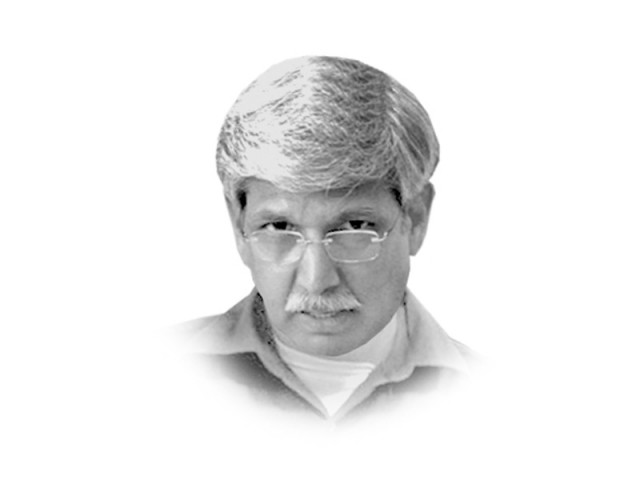Talks are the only way forward for Pakistan and India
Pakistan’s existential threat today will be India’s tomorrow. Hold back invites trouble. To not talk is holding back.

The writer is a defence analyst who retired as an air vice-marshal in the Pakistan Air Force.
It is another matter the same Indian colleague is one of the signatories in a letter by eminent Indians to their prime minister, strongly opposing his proposed meeting with his Pakistani counterpart on the sidelines of the upcoming UN General Assembly session. The ways of the subcontinent though are unique, and strange twists can trump even the best of predictions and principled stands. So, for the moment, Manmohan Singh is not meeting Nawaz Sharif, but then, who knows.
Let’s do a cost-benefit review. What is it that India can hope to ‘maximally’ achieve in its interaction with Pakistan, were the two to remain engaged in a sustained process; Azad Jammu and Kashmir (AJK) and the Northern Areas are reintegrated into Indian-held Kashmir, and accepted by both sides as inalienable parts of India. That shall pay put to the issue of the Line of Control (LoC) beyond Pt 9842, and matters as currently relate to the Siachen dispute and Indian presence along the Saltoro Ridge. Spin-offs with China of such a jackpot are multiple.
‘Minimally’, India will hope to retain the status quo; which really means that the LoC is accepted by both sides as the new border and matters on Kashmir rest as they stand. Except that the Kashmiris are unlikely to accept such bifurcation despite the convenience it will offer to the two belligerents to bring lasting peace through accommodation of mutual interests. This will call for some rather innovative structural formulation, which could satisfy the human and moral aspects of Kashmiri concerns while delivering to India and Pakistan, the much sought respite from a debilitating territorial dispute.
What is Pakistan’s ‘maximalist’ position: the entire region of Jammu and Kashmir, including stretches up to Ladakh as were included in the State of Kashmir in 1947, is ceded to Pakistan on the principles of Partition in 1947. This has been the basis of, at least, three and a half wars between the two countries. That subsumes the issue of Siachen and matters relating to boundaries in the north and east. ‘Minimally’, Pakistan will hope to find some comfort in a quid pro quo on Ladakh in India and in the Northern Areas of Pakistan; between Jammu in India and the southern districts of Mirpur and Kotli in Pakistan, while reuniting AJK with the Srinagar valley under the control of Pakistan. Such a solution shares the territorial gains, while minimising the pains of dividing the territories, and inalienably, some families.
It is realistic to discount both ‘maximalist’ positions as untenable. Both positions also denote a zero-sum undertaking — an unlikely course. Of the two ‘minimalist’ positions, how badly may Pakistan hope to achieve its ends, the current disparity in the power potential between the two nations and divergent trajectories in future growth tend to favour the Indian position better. Not engaging Pakistan, with the dice loaded in India’s favour, beats common sense.
With or without resolving the territorial disputes, if the two nations work towards opening up routes, trade and investment, and can find accommodation on Afghanistan, the region from Central Asia, West Asia to the limits of Kolkata can be integrated into a single economic bloc for energy, trading services for commodities and goods, infrastructure and travel. India remains the net gainer in this enterprise when its much larger industrial and manufacturing base, engineering goods, developed services sector and human resource can unleash her resident potential and realise unmet gains. Pakistan is in need of investment in areas where most Indian companies specialise, especially energy and medicine, and higher education, as indeed is the need for most of Central Asia and Afghanistan. Clearly, the key to this magic is held with Pakistan. Only fools will not wish to talk to Pakistan.
Terrorism, India’s bane, is best fought together. For that to happen, enough must be done in other areas to build confidence. Not talking does not build confidence. If indeed the construct of modern terrorism is charted, it becomes obvious that just as it might have been someone’s tool towards a fourth-generation war, it has now mutated into a self-sustaining mechanism, which finds its own course and pursues its own objectives. It also does not recognise borders and transverses conventional notions of nation states into international sympathy movements that transfer people and weapons with equal ease. What is only Pakistan’s existential threat today will be India’s tomorrow. Fighting this menace needs all hands at the regional level; holding back means inviting trouble. Not talking is holding back.
Can China and India coexist in any such future construct? I feel there is significant potential. The natural resources, the resident potential of the human resource and energy reserves in the region can be integrated through an elaborate infrastructure that physically binds the region into an economic and political relationship. To that end, both India and Pakistan, and their mutual antagonism, stand as the central hurdles. That can be removed by talking alone. Coexisting with China can make up for the Indian blunder of the initial years to stay uselessly disassociated with its own front yard.
Building all else without resolving territorial or political disputes is akin to building in air, without foundations or on suspect foundations. That is why talks across the entire spectrum are necessary. It is sensible and beneficial to talk. Not talking is a net loss; much more so to India.
Published in The Express Tribune, August 24th, 2013.
Like Opinion & Editorial on Facebook, follow @ETOpEd on Twitter to receive all updates on all our daily pieces.














COMMENTS
Comments are moderated and generally will be posted if they are on-topic and not abusive.
For more information, please see our Comments FAQ